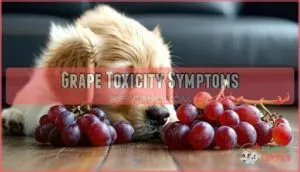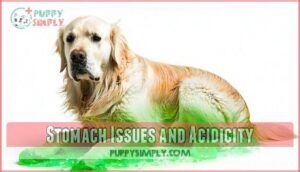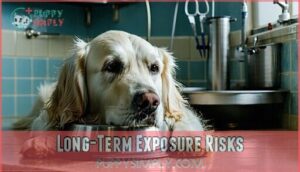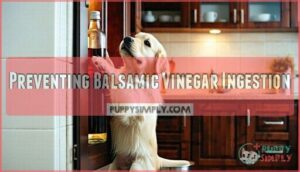This site is supported by our readers. We may earn a commission, at no cost to you, if you purchase through links.

Even though fermentation changes the grape’s makeup, the toxicity risk remains. Balsamic vinegar’s high acid content can also upset your pup’s stomach, causing vomiting or diarrhea.
Small dogs face higher risks since they’re more sensitive to these compounds. If your curious canine already snagged a taste, watch for symptoms like lethargy or loss of appetite.
Keep that bottle on high shelves where paws can’t reach. There are safer ways to add flavor to your dog’s meals.
Table Of Contents
- Key Takeaways
- Balsamic Vinegar Basics
- Can Dogs Eat Balsamic Vinegar
- Risks of Balsamic Vinegar Consumption
- Safe Alternatives to Balsamic Vinegar
- Preventing Balsamic Vinegar Ingestion
- Frequently Asked Questions (FAQs)
- How much balsamic vinegar can a dog have?
- Can dogs eat chicken with balsamic vinegar?
- What happens if my dog eats vinegar?
- Can dogs have vinegar dressing?
- Is there a safe amount of balsamic vinegar for dogs to consume?
- Is it safe to give my dog balsamic vinegar as a treat?
- How can I tell if my dog has consumed too much balsamic vinegar?
- Can I give my dog balsamic vinegar if they are on a special diet?
- Is balsamic glaze more dangerous than vinegar?
- Does balsamic vinegar affect medications for dogs?
- Conclusion
Key Takeaways
- Don’t give your dog balsamic vinegar – it’s made from grapes, which are toxic to dogs and can cause kidney failure, with no established safe amount for consumption.
- Watch for poisoning symptoms if your dog accidentally consumes balsamic vinegar, including vomiting, lethargy, loss of appetite, and excessive drooling – contact your vet immediately.
- Store balsamic vinegar securely in high cabinets or locked pantries where your curious pup can’t reach it, since even small amounts pose serious health risks.
- Choose safer alternatives like diluted apple cider vinegar, plain dog treats, or fresh vegetables when you want to add flavor to your dog’s meals without the toxicity concerns.
Balsamic Vinegar Basics
You’ve probably wondered if your dog can safely eat that balsamic vinegar from your kitchen cabinet.
Understanding what balsamic vinegar contains and how it affects dogs will help you make the right choice for your pet’s health.
Definition and Ingredients
Understanding what’s inside balsamic vinegar helps you make informed decisions for your dog’s safety.
This Italian condiment starts with grape must – crushed grapes including juice, seeds, and skins.
The production methods involve fermenting this grape mixture, creating acetic acid that gives vinegar its signature tang.
Sugar content varies between brands and aging processes.
Unlike other vinegar types, balsamic vinegar contains grape derivatives that raise red flags for dog owners concerned about their pet’s wellbeing.
Grape Toxicity Concerns
Since balsamic vinegar contains grape derivatives, it carries the same risks as feeding your dog fresh grapes. Grape poisoning represents one of the most serious threats to canine health, with kidney failure being the devastating end result.
The scary truth about grape toxicity is that there’s no established toxicity threshold. Individual sensitivity varies dramatically between dogs – some might eat grapes without issues while others face life-threatening complications from tiny amounts.
Even a tiny lick of balsamic vinegar could trigger life-threatening grape poisoning in your beloved dog.
Consider these frightening realities about hidden grapes in your dog’s environment:
- Grape toxicity symptoms may not appear for hours or days
- Dog toxicity symptoms can include vomiting, lethargy, and kidney shutdown
- No antidote exists once grape poisoning begins
- Balsamic vinegar contains concentrated grape compounds that amplify risks
- Toxicity can occur even from trace amounts in processed foods
Acidity Levels and Potential Harm
Balsamic vinegar packs a punch with its pH between 2-3, making it far too acidic for your dog’s system.
This acidity creates serious pH imbalance concerns and stomach irritation that can harm your pet’s health.
Balsamic vinegar toxicity dogs experience includes throat inflammation and digestive discomfort from these harsh acidity effects. Similarly, dogs may experience gastrointestinal upset from consuming pickles.
Can Dogs Eat Balsamic Vinegar
Your dog shouldn’t eat balsamic vinegar, despite common vinegar misconceptions.
This grape-derived condiment poses real risks due to acidity effects and potential toxicity. Safe amounts aren’t established, making any exposure concerning for most pets.
Here’s what you need to know about dogs eat balsamic situations:
- Grape toxicity – Balsamic vinegar contains grape derivatives that can harm dogs
- High acidity – Can upset sensitive stomachs and cause digestive issues
- No safe threshold – Even small amounts may affect some dogs differently
- Individual reactions – Some dogs show symptoms while others don’t
- Vet consultation – Always contact your veterinarian if ingestion occurs
While basil offers some health benefits for dogs, balsamic vinegar does not.
Risks of Balsamic Vinegar Consumption
When you consider giving your dog balsamic vinegar, you’re putting them at risk for grape toxicity since this condiment comes from fermented white grapes.
Your pet can experience stomach problems, kidney damage, and serious health issues from both the grape content and the high acid levels in balsamic vinegar.
Grape Toxicity Symptoms
Grape toxicity can turn your dog’s world upside down fast. Vomiting and diarrhea typically appear first, followed by weakness and lethargy. Your pup might lose their appetite completely or show signs of abdominal pain.
Dehydration sets in quickly, making them drink more water than usual. The scary part? Kidney failure can develop within 24-48 hours of eating grapes.
Watch for tremors, bad breath, and reduced urination—these dog poisoning symptoms signal serious trouble. Long-term effects from grape toxicity can be devastating.
If you spot these immediate symptoms, don’t wait. Contact your veterinarian immediately for proper treatment.
Stomach Issues and Acidicity
High acidity levels can turn your dog’s stomach into a battlefield.
Balsamic vinegar’s harsh acids don’t play nice with canine digestive systems, causing immediate discomfort and pH imbalance.
Watch for these warning signs if your dog consumes balsamic vinegar:
- Gastric irritation leading to sudden vomiting episodes
- Throat inflammation causing excessive drooling and discomfort
- Acid reflux triggering reduced appetite and food avoidance
- Digestive discomfort resulting in unusual lethargy and stomach sensitivity
Even tiny amounts spell trouble for sensitive pups.
Long-Term Exposure Risks
Your dog’s health can deteriorate slowly with repeated balsamic vinegar exposure.
Your dog’s system wasn’t designed to handle the harsh acids and grape compounds found in balsamic vinegar.
Chronic acidity builds up in their system, causing digestive issues that worsen over time.
Kidney damage becomes a serious concern as grape compounds accumulate.
Throat inflammation and pH imbalance develop gradually, making detection difficult.
| Risk Category | Symptoms | Timeline | Severity |
|---|---|---|---|
| Kidney Damage | Weight loss, lethargy, bad breath | Weeks to months | High |
| Digestive Issues | Chronic vomiting, reduced appetite | Days to weeks | Medium |
| Throat Inflammation | Difficulty swallowing, excessive drooling | Hours to days | Medium |
| pH Imbalance | Stomach discomfort, acid reflux | Immediate to ongoing | Variable |
Safe Alternatives to Balsamic Vinegar
You don’t need to risk your dog’s health with balsamic vinegar when safer options exist.
Apple cider vinegar in small amounts, plain dog treats, and fresh vegetables like carrots provide flavor without the grape toxicity concerns.
Apple Cider Vinegar Benefits
While balsamic vinegar poses risks, apple cider vinegar offers a safer alternative for dogs and vinegar enthusiasts.
This dog-friendly condiment provides digestion aid and supports skin health when diluted properly.
Many owners use it for allergy relief and weight management, though immune boost claims need more research.
A diluted solution can also help balance ear pH levels.
Always consult your vet before introducing apple cider vinegar to your pet’s routine.
Is vinegar bad for dogs? Not all types—but moderation matters.
Start with tiny amounts to gauge your dog’s tolerance and avoid adverse reactions.
Dog-Friendly Food Options
When searching for healthy alternatives to balsamic vinegar, you’ll find plenty of safe foods for dogs that won’t compromise their health.
Instead of wondering "is balsamic safe for dogs," focus on these proven options:
- Safe Vegetables like carrots, green beans, and sweet potatoes provide essential nutrients
- Lean Proteins including chicken, turkey, and fish support muscle development
- Healthy Treats such as blueberries and plain rice offer safe, tasty rewards
Many owners choose to offer their dogs dog-safe vegetable options.
Avoiding Human Foods With Toxic Ingredients
When selecting safe foods for your dog, you’ll need to navigate a kitchen filled with hidden dangers.
Many common ingredients pose serious dog health risks and canine toxicity concerns.
Here are toxic foods for dogs to avoid completely:
- Chocolate and caffeine products
- Onions, garlic, and chives
- Xylitol in sugar-free items
- Grapes and raisins (like balsamic vinegar dogs shouldn’t have)
- Macadamia nuts and walnuts
Label reading becomes your best friend for identifying toxic ingredients, and it’s crucial to practice portion control with safe foods and choose proper treat alternatives to keep your pet healthy and safe from toxicity.
Preventing Balsamic Vinegar Ingestion
You’ll want to store balsamic vinegar in secure cabinets or high shelves where your dog can’t reach it.
Watch your dog’s behavior closely for any unusual symptoms after potential exposure, and contact your vet immediately if you notice any changes in appetite, energy, or bathroom habits, especially if they show unusual symptoms.
Keeping Vinegar Out of Reach
Smart pet owners know that prevention beats treatment every time. Your dog’s curiosity can lead to trouble if balsamic vinegar sits within reach.
Childproofing methods work wonders for protecting your furry friend from toxicity risks. Luckily, you can easily find dog-proof cabinet latches to secure your cabinets.
| Storage Location | Security Level |
|---|---|
| High cabinet shelves | Maximum |
| Locked pantry | High |
| Refrigerator door | Medium |
| Counter tops | Low |
Cabinet locks provide the best defense against accidental ingestion. Elevated shelves work well for smaller bottles, but determined dogs can surprise you. Secure storage prevents dog health risks before they start.
Keep spill cleanup supplies handy too, because accidents happen even with the best pet safety measures in place.
Monitoring Dog Behavior and Health
After securing balsamic vinegar safely, keep a watchful eye on your dog’s daily habits. Behavioral Changes happen quickly, so dog health monitoring becomes your best defense against pet poisoning.
Track these warning signs:
- Appetite Changes – refusing food or eating less than usual
- Vomiting Signs – frequency and timing of episodes
- Urination Patterns – increased or decreased bathroom breaks
- Lethargy Monitoring – unusual tiredness or lack of energy
Document dog behavior shifts in a simple notebook. Dog poisoning symptoms don’t always appear immediately, making consistent observation vital for catching problems early.
Consulting a Veterinarian for Advice
While monitoring helps you spot problems early, your veterinarian provides the expertise you need for proper dog health decisions. When to consult your vet about balsamic vinegar concerns depends on your dog’s specific situation.
Emergency situations like excessive vomiting require immediate veterinary advice. Some breeds show breed sensitivity to acidic foods, making professional guidance even more important.
Ensuring optimal nutrition for dogs is also essential for their overall well-being. This includes being aware of the potential risks associated with certain foods and taking steps to prevent harm.
- Contact your vet before making any dietary changes involving vinegar or acidic foods
- Call immediately if your dog shows distress after consuming balsamic vinegar
- Ask about specific concerns related to your dog’s breed, age, or existing health conditions
- Request guidance on safe alternatives that won’t compromise your pet health goals
Frequently Asked Questions (FAQs)
How much balsamic vinegar can a dog have?
Dogs shouldn’t have any balsamic vinegar.
It’s made from grapes, which are toxic to dogs and can cause kidney failure.
Even tiny amounts pose risks.
Skip it entirely and choose dog-safe treats instead.
Can dogs eat chicken with balsamic vinegar?
You shouldn’t feed your dog chicken with balsamic vinegar.
The vinegar contains grape derivatives that’re toxic to dogs and can cause kidney problems.
Stick to plain, unseasoned chicken for your pup’s safety.
What happens if my dog eats vinegar?
If your dog eats vinegar, they’ll likely experience stomach upset, vomiting, or diarrhea due to high acidity.
Watch for excessive drooling and throat irritation.
Contact your vet if symptoms worsen or persist, as this could indicate a serious issue with high acidity.
Can dogs have vinegar dressing?
Vinegar dressing isn’t safe for your pup.
Most contain balsamic vinegar made from grapes, which are toxic to dogs.
The high acidity can also upset their stomach.
Skip it and choose dog-friendly treats instead.
Is there a safe amount of balsamic vinegar for dogs to consume?
Playing with fire regarding your pup’s safety?
There’s no established safe threshold for balsamic vinegar consumption in dogs.
The grape-derived ingredients make any amount potentially risky, so it’s best avoided entirely.
Is it safe to give my dog balsamic vinegar as a treat?
No, you shouldn’t give your dog balsamic vinegar as a treat.
It’s made from grapes, which are toxic to dogs and can cause kidney failure.
The high acidity also irritates their stomach.
How can I tell if my dog has consumed too much balsamic vinegar?
Watch for vomiting, drooling, lethargy, and reduced appetite after your pup accidentally gets into balsamic vinegar.
You’ll also notice excessive water drinking, difficulty swallowing, or stomach discomfort.
Contact your vet immediately if symptoms appear.
Can I give my dog balsamic vinegar if they are on a special diet?
Regardless of your dog’s special diet, you shouldn’t add balsamic vinegar.
It contains grape derivatives that can cause kidney failure, plus its high acidity disrupts digestion.
Stick to vet-approved foods instead.
Is balsamic glaze more dangerous than vinegar?
Balsamic glaze typically contains more concentrated sugars and grape content than regular vinegar, making it potentially more dangerous for your dog.
The concentrated nature amplifies toxicity risks from grapes and creates additional blood sugar concerns.
Does balsamic vinegar affect medications for dogs?
Sure, let your dog play chemistry lab with their meds!
Balsamic vinegar can interfere with certain medications by altering stomach pH levels.
This affects drug absorption rates.
Always consult your vet before mixing human foods with prescribed treatments, as this can have significant effects on the medications.
Conclusion
Protecting your furry companion from kitchen mishaps means keeping balsamic vinegar safely stored away.
While this flavorful condiment enhances human meals, it poses real risks to dogs through grape-derived toxins and harsh acidity.
Can dogs eat balsamic vinegar? The answer remains a firm no.
Watch your pup closely around cooking areas, choose dog-safe alternatives when sharing treats, and contact your veterinarian immediately if accidental consumption occurs.
Your dog’s health depends on your vigilance.
- https://pubmed.ncbi.nlm.nih.gov/11972679/
- https://pangovet.com/?utm_source=dogster&utm_medium=article&utm_campaign=dog_eat_drink
- https://petkeen.com/apple-cider-vinegar-dogs-uses-benefits/
- https://www.dogster.com/dog-nutrition/can-dogs-have-balsamic-vinegar
- https://dogfeedingadvice.com/can-dogs-eat-balsamic-vinegar/














